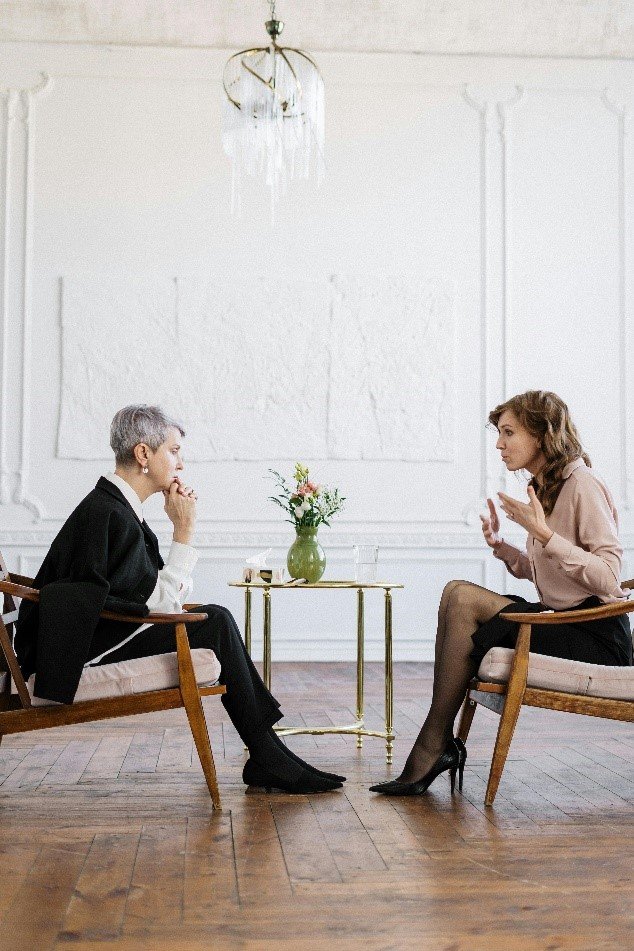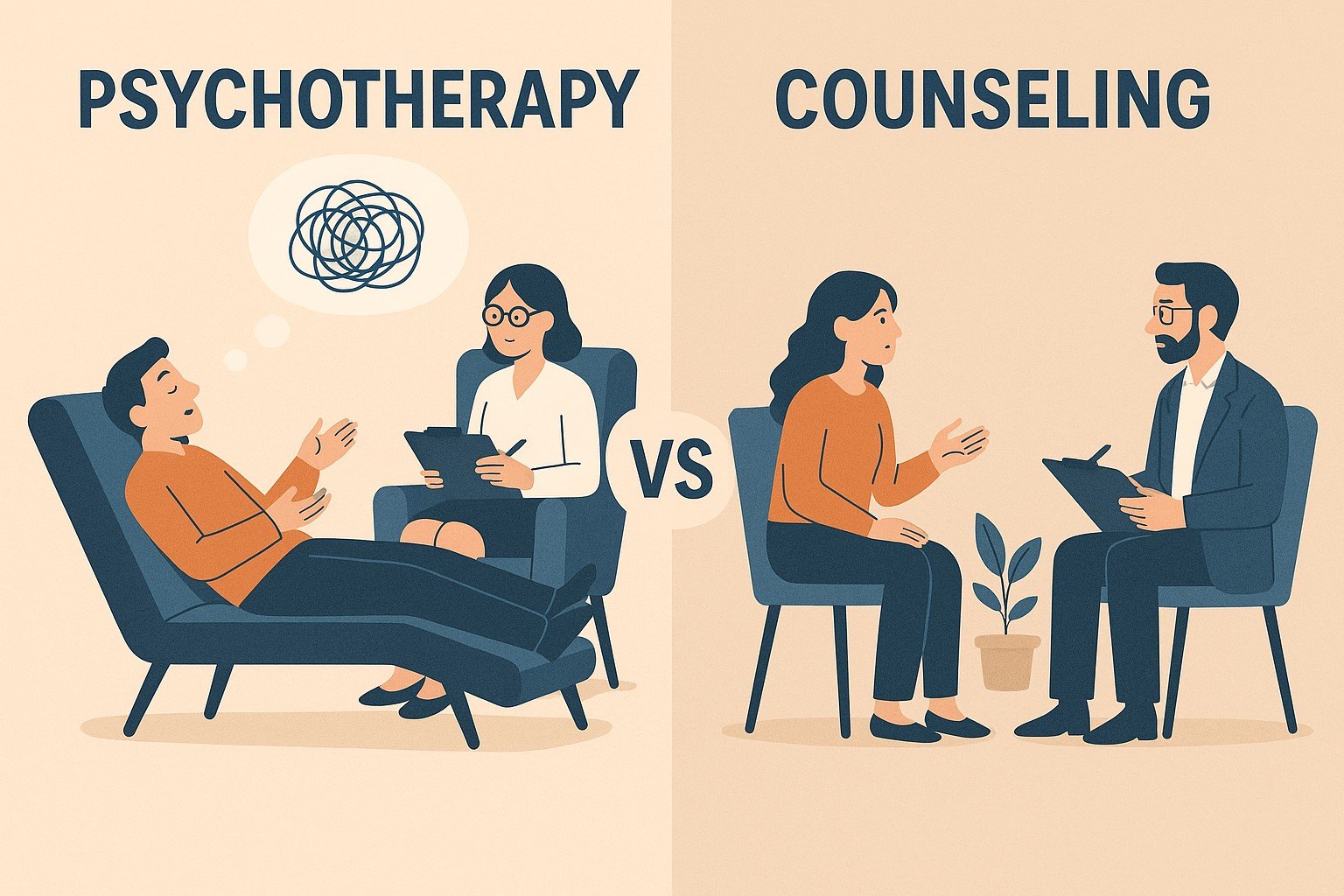Psychotherapy vs Counseling: Key Differences
In times of emotional difficulty and personal growth, people generally have access to two main types of help: psychotherapy and counseling. While these two terms are often used interchangeably, they refer to different approaches within the mental health system.
Psychotherapy usually focuses on the exploration of a person’s past and enduring patterns of earlier experiences to achieve long term self-development. On the other hand, counseling is focused on the particular problem or life transition, addressing immediate coping strategies, and therefore provides immediate relief.
At Heal & Thrive, we place a special focus on developing lasting trust and processes towards real change by emphasizing fostering lasting change around the client’s individual needs.
This article addresses the differentiating factors between counseling and psychotherapy that shape one’s informed decision based on their emotional needs and understanding gaps.
Definition of Terms
Psychotherapy is an organized, research-based therapeutic approach in which qualified practitioners assist patients in examining ingrained feelings, actions, and cognitive patterns. It frequently uses a variety of techniques, including trauma-focused therapy, EMDR, and cognitive behavioral therapy, to address persistent psychological issues.
Contrarily, counseling is usually a more focused, short-term strategy that offers support and direction during particular life challenges like relationship problems, stress, or grief.
Under the general heading of mental health treatment, psychotherapy and counseling both provide individualized assistance to improve emotional health, foster resilience, and encourage constructive life changes.
Key Differences at a Glance
Aspect | Counseling | Psychotherapy |
Duration | Short-term (weeks to months) | Long-term (months to years) |
Focus | Specific issues or behaviors | Deep-seated emotional problems |
Approach | Solution-focused | Exploratory and insight-oriented |
Practitioner | Counselors, often with a master’s degree | Psychologists, psychiatrists, or licensed therapists |
Techniques | Guidance and advice | Various therapeutic modalities (e.g., CBT, ACT) |
Although both psychotherapy and counseling are alike in some ways, they differ widely from each other on several matters. Therapy is generally considerably more substantive (the lengthier course typical uses addressing deep psychological wounds such as trauma, personality disorders or chronic mental health problems). It commonly use specific tools like Cognitive Behavioral Therapy (CBT), Psychoanalysis and Humanistic therapy. Usually, counseling is very short-term and directed at a small specific issue – stress a relationship issue or career choice for example. Counseling is solution-focused using tools such as solution-focused brief therapy.
Another distinction lies in the client’s age and needs: psychotherapy may be recommended for clients requiring intensive intervention, while counseling suits those seeking guidance or coping strategies for immediate concerns.
Therapists providing psychotherapy generally have advanced clinical training, whereas counselors may come from varied professional backgrounds with specalized training in support and guidance.
When to Choose Psychotherapy vs Counseling
When deciding between psychotherapy and counseling, there are a few considerations relating to the problem at hand and how severe it is. Psychotherapy is usually indicated for long term mental health problems and conditions involving uncomfortable and excessive internal states which are persistent, complex/or require deep level treatment that spans over time. Great for anyone who wants to explore root cause emotional programs and make true lasting psychological shifts.
Individuals dealing with the stresses of daily life including coping with stress, problems in relationships or just needing someone to talk to about a difficult decision should consider counseling. It usually employs strategies to problem-solve and develop new skills that can be employed in current life situations.

Psychotherapy may be preferable as well when symptoms do not remit after induction or otherwise demonstrate a feature that points to the need of psychological therapy from a healthcare professional.
Counseling is often an appropriate first step or add-on to psychotherapy, shorter in duration and less expensive.
Benefits of Both Approaches
Psychotherapy and counseling are both extremely valuable for mental health, wholistic wellness as professions; each with its own strengths. The benefits of psychotherapy are long term by targeting the very core of underlying psychological problems, for deep emotional healing and permanent behavioral change. Helpful for anxiety, depression and personality disorders symptoms; acts as an anchor in general psychological resiliency.
Counseling is able to provide immediate help for one’s current life challenges including coping with stress and conflict in relationships, decision making. This builds coping strategies, communication abilities in victims and increases problem solving and emotion regulation.
Further more, the approaches establish better mental health, better relationships and overall quality of life. Psychotherapy more potentially includes in-depth psychological work, counseling is usually more accessible, shorter term and client-focussed so could take the form of complementary.

Common Types in Each Approach
Psychotherapy is a whole lot of well-established forms dealing with deep healing at the level of the psyche. CBT (Cognitive Behavioral Therapy) is a very common method of resolving negative thought cycles and behaviors, which in turn allows people with anxiety or depression to function better. Psychoanalysis digs into unconscious mind origins and childhood experiences to get to the heart of psychological disorders, human behaviours.
Humanistic therapy is client centered, based on personal development, self-exploration and the relationship between client and therapist that encourages self-actualization.
On the contrary, counseling is usually individual counselling a family counselling and sometimes an educational/career counseling as well. The approaches, of course are usually problem-solving based and work to address right in concerns of individuals, as well provide readiness strategies. Counseling can also have brief therapy aspects, and what one would consider supporting psycho listening that both offers emotional release but decision making.
Psychotherapy and counseling range in diversity of type to meet many client needs, thus they are adaptive tools of psychological support/mental wellness systems.
There is abundant research displaying efficacy of both psychotherapy and counselling for enhanced mental health & well-being. The American Psychological Association (APA) states that psychotherapy may significantly decrease symptoms of depression, anxiety and other psychological disorders with benefits often lasting over time (Campbell et al., 2013).
Among studies such as Seligman (1995), this suggests that regular psychotherapy, or specifically CBT like approach, works well in a really wide range of humans.
Even though some times shorter than therapy, counseling is helpful in coping with life transitions and stress or situational difficulties. McAleavey et al. (2019) argue is that the “success of therapy is largely dependent on whether or not the method/technique fits the needs of your client better than no treatment, and not by the length of therapy.
Both methods facilitate emotional recovery, coping skill improvement and healthier relationships, showing how mutually reinforce each other in mental health care.
Psychotherapy and Counseling in Online Settings
Technology has helped to expand the accessibility and efficacy of online psychotherapy, counseling. Online sessions provide flexibility and convenience to access mental health support for those who may be unable to seek help due to, for instance geographic isolation, mobility issues or busy schedules. Studies have shown that online therapy (including CBT and other empirically supported treatments) may be as efficacious for many conditions, such as anxiety and depression as in-person treatment.
While online counseling tends to be more suited for the quickly temporary needs of guidance and coping skills while online psychotherapy usually tackles deep rooted, long-standing psychological issues. The modalities are both delivered through secure video calls, chats or phone consultations for carrying on the therapy. The digital shift that this marks in mental health care access is particularly important, for at-risk or underserved populations and in times of crisis (as with today’s COVID-19 epidemic).
Cost and Accessibility
Some important things to consider when deciding between psychotherapy and counseling is cost & accessibility. Usually counselling is faster, cheaper and aimed at solving a particular problem or addressing life difficulties. Psychotherapy, which may be longer-term and more focused and intensive may involve more extensive costs cauased by depth of treatment.
A: Insurances vary some cover therapy and psychotherapy and others only do psychotherapy; also extent and eligibility varies but the requirements do not. Even the availability of qualified professionals can be limited by location, availability and wait times. Online platforms have made up for these way by offering more accessible and flexible psychotherapy and counseling options.
The bottom line with cost/benefit tradeoff between cost and actual requirements (mental health) is a must have in mind for an informed choice.
How the issue you face, your goals of treatment and practical constraints (time, cost) determine which should be psychotherapy or counseling. counseling provides a shorter, less intensive path to managing problems than psychotherapy for more serious conditions, and barrages are optimized for focused support. Benefits of the two have also been well substantiated and the combination of both approaches can provide a comprehensive plan for one’s mental well-being.
Once the core differences are recognized, they provide you with the knowledge needed to make decisions and seek out the proper professional help. Both in-person and online, psychotherapy and counseling are leg quests to heal mental health, relieve stress and live your best.
Consulting with a licensed mental health professional through he althandthrive.org confers the wisdom of knowing that will best help you, no matter what support method you decide to pursue at this time.
Ready to talk with a caring therapist? Book your free consultation today with Heal & Thrive. Your mental health is important let’s take that first step together!



You’ve articulated these concepts with such elegance and precision. It’s as if you took the disparate thoughts floating in my mind and perfectly organized them into a coherent framework. A truly masterful piece of writing.